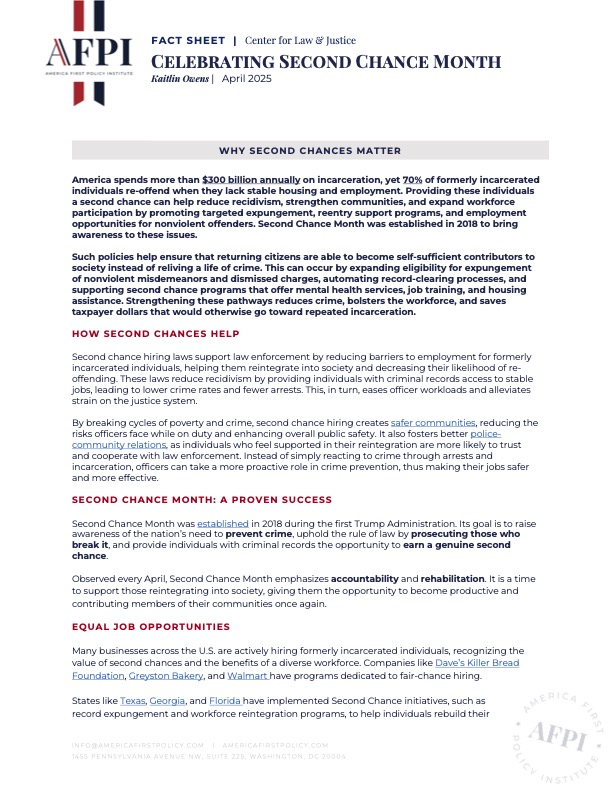Celebrating Second Chance Month
America spends more than $300 billion annually on incarceration, yet 70% of formerly incarcerated individuals re-offend when they lack stable housing and employment. Providing these individuals a second chance can help reduce recidivism, strengthen communities, and expand workforce participation by promoting targeted expungement, reentry support programs, and employment opportunities for nonviolent offenders. Second Chance Month was established in 2018 to bring awareness to these issues.
Such policies help ensure that returning citizens are able to become self-sufficient contributors to society instead of reliving a life of crime. This can occur by expanding eligibility for expungement of nonviolent misdemeanors and dismissed charges, automating record-clearing processes, and supporting second chance programs that offer mental health services, job training, and housing assistance. Strengthening these pathways reduces crime, bolsters the workforce, and saves taxpayer dollars that would otherwise go toward repeated incarceration.
HOW SECOND CHANCES HELP
Second chance hiring laws support law enforcement by reducing barriers to employment for formerly incarcerated individuals, helping them reintegrate into society and decreasing their likelihood of re-offending. These laws reduce recidivism by providing individuals with criminal records access to stable jobs, leading to lower crime rates and fewer arrests. This, in turn, eases officer workloads and alleviates strain on the justice system.
By breaking cycles of poverty and crime, second chance hiring creates safer communities, reducing the risks officers face while on duty and enhancing overall public safety. It also fosters better police-community relations, as individuals who feel supported in their reintegration are more likely to trust and cooperate with law enforcement. Instead of simply reacting to crime through arrests and incarceration, officers can take a more proactive role in crime prevention, thus making their jobs safer and more effective.
SECOND CHANCE MONTH: A PROVEN SUCCESS
Second Chance Month was established in 2018 during the first Trump Administration. Its goal is to raise awareness of the nation’s need to prevent crime, uphold the rule of law by prosecuting those who break it, and provide individuals with criminal records the opportunity to earn a genuine second chance.
Observed every April, Second Chance Month emphasizes accountability and rehabilitation. It is a time to support those reintegrating into society, giving them the opportunity to become productive and contributing members of their communities once again.
EQUAL JOB OPPORTUNITIES
Many businesses across the U.S. are actively hiring formerly incarcerated individuals, recognizing the value of second chances and the benefits of a diverse workforce. Companies like Dave’s Killer Bread Foundation, Greyston Bakery, and Walmart have programs dedicated to fair-chance hiring.
States like Texas, Georgia, and Florida have implemented Second Chance initiatives, such as record expungement and workforce reintegration programs, to help individuals rebuild their lives. These efforts not only reduce recidivism but also strengthen local economies by expanding employment opportunities.
AN AMERICA FIRST APPROACH
Second Chance Month is consistent with America First policies because it promotes public safety, economic growth, and the fundamental American value of redemption. Rather than leaving people trapped in cycles of incarceration, Second Chance Month focuses on accountability, opportunity, and self-sufficiency, in turn making our communities safer and more prosperous.
- Boosts the American Workforce: Giving rehabilitated individuals a second chance means more people working, fewer people on government assistance, and a stronger economy driven by personal responsibility.
- Reduces Crime and Strengthens Public Safety: When ex-offenders have jobs and stability, they are far less likely to re-offend, thus reducing crime rates and easing the burden on law enforcement and taxpayers.
- Supports American Families and Communities: Second chances help reunite families, restore dignity, and break generational cycles of poverty and incarceration, making our communities stronger and more united.
These are America First policies because they promote personal responsibility, economic self-sufficiency, and taxpayer accountability—all while ensuring that communities are safer and stronger.
